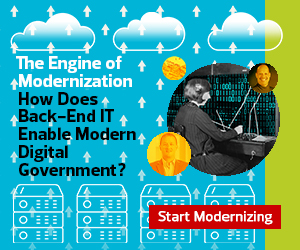5 Reasons to Use the Cloud Buyer’s Broker Model
Here are five key reasons state and local government IT leaders should consider using the cloud buyer’s broker model.
- Provides unbiased insight and expertise. The cloud buyer’s broker is an independent party with the agency’s best interests at heart: to map the best workload to the best CSP environment. The model provides IT teams with visibility into where to run an application based on the best price and purpose of the workload. As an unbiased party, the cloud buyer’s broker can provide authentic insight. The cloud broker also provides a village of cloud experts across all major cloud technologies, enabling agencies to take advantage of an expanded workforce to manage and optimize their cloud investments and deliver 24/7 services and security monitoring to customers.
- Delivers the greatest value. The cloud buyer’s broker understands pricing models and can leverage volume and relationships. With a trusted partner, customers can focus on what they need rather than how they should get it. In addition, agencies often feel constrained in their cloud choices by the resources they have on staff. A team may have significant expertise in AWS but limited resources for Microsoft Azure. A cloud broker can help navigate options and provide management support to help organizations purchase, deploy, and manage the best option for each application and workload.
- Prevents cloud sprawl. The cloud buyer’s broker provides a systematic approach to managing a cloud environment. It shows the big picture of the environment and how to best leverage all options to keep sprawl in check. It provides a strategic rather than a one-off approach.
- Streamlines management and administration. The cloud buyer’s broker streamlines how agencies effectively manage diverse cloud environments and simplifies administration with centralized billing and a unified experience. This helps ease the resource burden on agency IT teams under stress to deliver on a growing list of deliverables and priorities.
- Helps strengthen cybersecurity posture. The cloud buyer’s broker helps agency customers understand security and compliance requirements when developing cloud solutions and ensures that the necessary checks and controls are in place to start. Additionally, the broker can provide ongoing monitoring and management services to maintain and update security.
RELATED: Transitioning to digital services starts with identifying government needs.
Selecting the Right Cloud Buyer’s Broker for your Agency
Choosing the right cloud buyer’s broker is critical to success; not all are created equal. The broker must be of the right size and scale, with recognized experience.
When it comes to what to look out for when evaluating and choosing a cloud buyer’s broker, there are several things to consider:
- Recognition as key partners or experts by multiple cloud providers, customers, and industry
- The number of cloud experts on staff as regular employees, not contractors
- Expertise using emerging technologies to deliver innovative cloud solutions across different public and private cloud platforms
- Meeting key federal and state and local government security and compliance standards
- Whether managed cloud security is a core service offered by the company and whether always-on, U.S.-based customer support is available
EXPLORE: Follow these tips for migrating government services to the cloud.
What Success Looks Like for Agencies in a Multicloud World
One of the largest state technology agencies is pioneering how the cloud buyer’s broker is used to comprehensively manage multicloud solutions to support IT modernization initiatives across data center services.
Its cloud broker manages all public cloud workloads under a statewide contract that currently has 23 state agencies using AWS, Azure, and Google through the contract — and momentum is growing.
The broker is also doing more than moving on-premises applications into the cloud; a center of excellence is transforming and innovating services for better IT outcomes and better constituent services.












